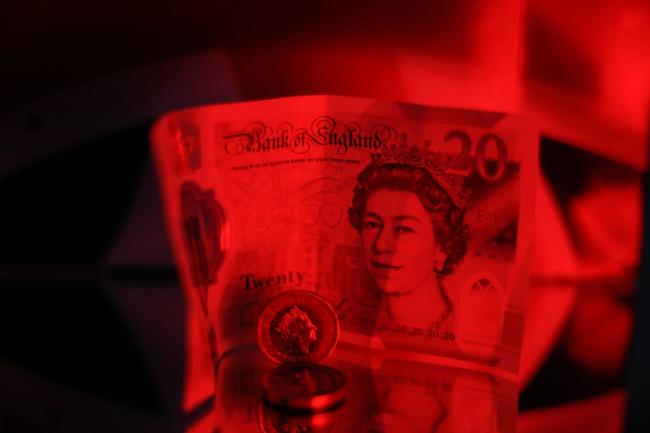 © Bloomberg. A British twenty pound banknote and a one pound sterling coins sits in this arranged photograph in London, U.K., on Wednesday, Oct. 14, 2020. Pound traders are remarkably nonchalant even as U.K. Prime Minister Boris Johnson's self-imposed deadline of Oct. 15 to get a trade deal with the European Union looms large. Photographer: Hollie Adams/Bloomberg
© Bloomberg. A British twenty pound banknote and a one pound sterling coins sits in this arranged photograph in London, U.K., on Wednesday, Oct. 14, 2020. Pound traders are remarkably nonchalant even as U.K. Prime Minister Boris Johnson's self-imposed deadline of Oct. 15 to get a trade deal with the European Union looms large. Photographer: Hollie Adams/Bloomberg
(Bloomberg) --
Investors should hedge for an “existential” sterling crisis as the British currency faces struggles usually seen in emerging markets, according to Bank of America Corp. strategists.
The Bank of England continuing to hike interest rates won’t be enough to rescue the pound, strategist Kamal Sharma said in a note. Instead, there’s a risk the nation’s current account deficit, a deterioration of its relationship with the European Union over Northern Ireland and questions around the central bank’s credibility combine to create a “perfect storm.”
“Whilst not wishing to over-exaggerate GBP’s predicament as some kind of ‘end-of-days’ scenario, we are concerned that the increasing politicization of UK policy undermines the GBP in ways that would appear EM-like,” Sharma wrote in a note. “We sense something is changing in the UK, with the BOE increasingly hard to decipher and less transparent; a failure to discuss and acknowledge that Brexit has been a significant headwind to the supply side; and a sense that the BOE is losing control over its mandate.”
It’s not the first time in recent years Wall Street strategists have drawn parallels between the British currency and emerging markets. The comparison was made amid the UK’s tortuous exit from the European Union, where political headlines whipsawed sterling as its behavior broke from major peers. BofA strategists have likened the pound’s behavior to an EM currency in the past.
Political Attacks
The BOE has faced political attacks this month over its response to inflation, which is at its fastest rate in four decades. Despite four interest-rate increases since December and money markets bracing for more in each of its next five decisions, the pound is the third-worst performing major currency this year.
“At a point of increased uncertainty over domestic growth, signs of regional fragmentation and Northern Ireland-related risks, the UK will find it increasingly difficult to attract portfolio flows to finance a widening current-account deficit,” said Citigroup Inc strategist Vasileios Gkionakis, who recommends betting against the pound versus the euro.
Read: Pound Fights for Reprieve as Economy Flails
BofA’s Sharma stresses he is not saying the pound is an emerging-market currency, but rather that investors are increasingly viewing the currency as taking on developing-nation characteristics. He recommends clients hedge for the risk of “a current-account-led crisis” via wing-type structures.
“The UK current account deficit is not a new phenomenon. But what has changed has been liquidity and trading conditions around GBP and one of the most challenging macro/policy backdrops in almost a generation,” he said. “What strikes us, despite GBP being one of the most actively traded currencies in the world, is how it has regularly succumbed to liquidity black holes since 2016.”
©2022 Bloomberg L.P.

